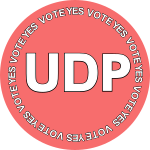Ulster Democratic Party facts for kids
Quick facts for kids
Ulster Democratic Party
|
|
|---|---|
 |
|
| Founded | June 1981 |
| Dissolved | November 2001 |
| Preceded by | New Ulster Political Research Group |
| Succeeded by | Ulster Political Research Group |
| Paramilitary wing | Ulster Defence Association |
| Ideology | Ulster loyalism Ulster nationalism Devolution |
| Political position | Centre-right to right-wing with far-right factions |
The Ulster Democratic Party (UDP) was a small political group in Northern Ireland. It was formed in June 1981. The party was linked to the Ulster Defence Association (UDA), a group that supported Northern Ireland remaining part of the United Kingdom. The UDP took the place of an earlier group called the New Ulster Political Research Group. A different party with the same UDP name existed in the 1930s, but it was not connected to this one.
Contents
History of the UDP
The Ulster Democratic Party started within the Protestant community in Northern Ireland. At first, the party had a different idea for Northern Ireland's future. Instead of staying fully part of the UK, they wanted Northern Ireland to become an independent country. This new country would still be linked to the European Economic Community (now the European Union) and the Commonwealth. This idea came from their earlier group, the New Ulster Political Research Group.
However, this idea did not become popular with voters. So, the UDP changed its mind. They began to support the UDA's plan, which suggested having a local government (an assembly and executive) for Northern Ireland. This government would be chosen using a fair voting system called proportional representation, where seats in government match the number of votes each party gets. They also wanted a written list of rights and rules for the region.
Early Elections and Growth
In its early years, the UDP did not win many votes. Their first try in an election was not very successful. In 1982, the party leader, John McMichael, received only a small number of votes. Other candidates in the 1982 Assembly election also did not win.
The party finally had a breakthrough in the 1989 local elections. Ken Kerr won a seat on the Derry City Council. Around this time, the party shortened its name from "Ulster Loyalist Democratic Party" to "Ulster Democratic Party." Even though Ken Kerr lost his council seat in 1993, Gary McMichael (John McMichael's son) won a seat on the Lisburn City Council for the party. The UDP continued to grow, winning four council seats in the 1997 local elections.
Peace Talks and Challenges
The UDP became more well-known after it helped with a ceasefire (a stop to fighting) by loyalist groups in 1994. The party also took part in the 1996 election for the Northern Ireland Forum. They did not win any direct seats, but because they were one of the ten most successful parties, they were given two extra seats. These seats went to Gary McMichael and John White.
Having these seats meant the UDP could join important talks that led to the 1998 Belfast Agreement. This agreement was a big step towards peace in Northern Ireland. However, in January 1998, the UDP chose to leave the peace talks. This happened because of some serious actions by the Ulster Freedom Fighters, which was another name used by the UDA.
The party officially supported creating a new local government, the Northern Ireland Assembly. But this idea caused disagreements within the UDP and with the UDA. This led to some members leaving the party. The UDP did not win any seats in the 1998 Assembly election. Their support also went down in the 2001 local elections. In these elections, their candidates had to run as independent candidates because the party forgot to officially register its name.
End of the Party
Disagreements about the Belfast Agreement continued between the UDP leaders and the UDA. In July 2001, Gary McMichael said that the UDP could no longer speak for the UDA, because the UDA had declared itself against the peace agreement. Because of these problems, the Ulster Democratic Party closed down in November 2001. Another group, the Ulster Political Research Group, has largely taken over its role.
Election Results
UK Parliament By-Elections
| Date of election | Area | Candidate | Votes | % | Position |
|---|---|---|---|---|---|
| 4 March 1982 | Belfast South | John McMichael | 576 | 1.3 | 5th |
| 2 February 1990 | Upper Bann | Gary McMichael | 600 | 1.7 | 8th |
Northern Ireland Assembly Elections
| Election | Candidates | Seats won | ± | First pref. votes | % | ± |
|---|---|---|---|---|---|---|
| 1982 | 2 |
0 / 78
|
1,086 | 0.17 | ||
| 1996 | 52 |
2 / 78
|
16,715 | 2.24 | ||
| 1998 | 9 |
0 / 78
|
8,651 | 1.07 |
Local Elections
| Election | Seats won | ± | First pref. votes | % | ± |
|---|---|---|---|---|---|
| 1985 |
0 / 565
|
782 | 0.1 | ||
| 1989 |
1 / 565
|
2,413 | 0.4 | ||
| 1993 |
1 / 582
|
2,181 | 0.4 | ||
| 1997 |
4 / 582
|
6,244 | 1.0 |
 | Sharif Bey |
 | Hale Woodruff |
 | Richmond Barthé |
 | Purvis Young |

